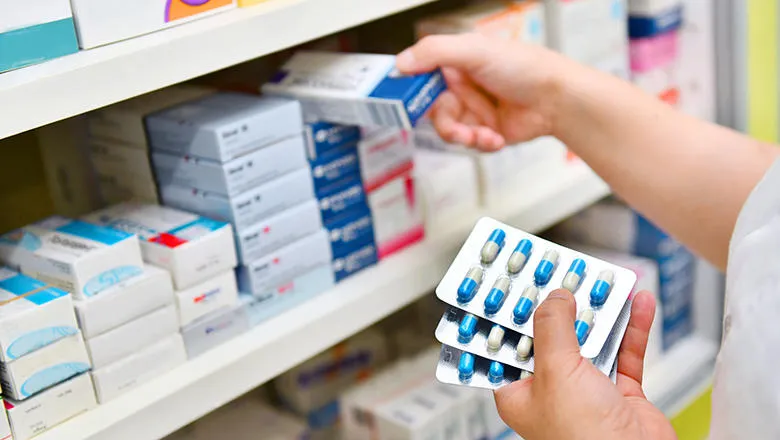Bacterial multidrug resistance continues to spread at alarming rates, threatening human health globally. If there ever is going to be a quick solution to dealing with something like a pandemic, employing efflux pump inhibitors will help us re-tool the existing treatments we already have."
Dr Eamonn Reading, Department of Chemistry
19 July 2023
New approach to drug design promises hope in fight against antimicrobial resistance
Researchers from the Department of Chemistry develop breakthrough in the war against antimicrobial resistance.

A new approach to drug design could be the key to destroying superbugs and restoring the effectiveness of antibiotics.
A team led by members of Department of Chemistry, King’s College London, in collaboration with scientists from the University of Oklahoma and the Georgia Institute of Technology, have discovered a new method that could prove cheaper and more efficient at dealing with antimicrobial resistance (AMR) by preventing bacteria becoming resistant to current antibiotics.
The World Health Organisation has labelled AMR as one of the biggest threats to global health, food security, and development. In 2019 1.27 million deaths were attributed to bacterial AMR world-wide, more than HIV and malaria combined.
In a paper published by Nature Communications, chemists Dr Eamonn Reading and Benjamin Russell Lewis provide a novel approach for how the efficacy of current antibiotics can be restored by use of a tool called an efflux pump inhibitor, which synergises with antibiotics to combat bacterial resistance.
Bacteria can become resistant to antibiotics by drawing on their efflux pumps – proteins which recognise antimicrobial agents and ejects them before reaching their target. This means the bacteria can reduce the concentration of antibiotics that reach the inside of the cell, increasing the likelihood of treatment failure.
Chemists from King’s College London are now targeting the efflux pump response to prevent this mechanism.
Benjamin Russell Lewis from the Department of Chemistry said: “We discovered an inhibitor that acts as a ‘molecular wedge’ to neutralise the effective movement of the protein controlling the efflux pump response. Previous studies have identified that this particular inhibitor helped antibiotics kill bacteria but no-one knew why or how, until now.
“Traditional methods have focused on inhibitors targeting proteins in the inner cell membrane of bacteria. We demonstrate that inhibitors targeting the area between the inner and outer cell membranes could work better.”
These insights could lead to the development of new and more effective treatments by revive pre-existing antibiotics, which bacteria have become resistant to. By reducing the need to invest time and resources into new antibiotic production, treatments to previously resistant diseases can be developed at speed and low cost, as existing drugs are repurposed and previously resistant diseases destroyed.
The scientists hope that by providing the groundwork for how these cells and proteins interact at a molecular level, pharmacologists will be able to produce this new class of inhibitors and antibiotic treatments in time for the next generation of superbugs.
The exciting work published by the team at King’s College London is an excellent approach to repurposing antibiotics. It could lead not only to the development of new and more effective treatments, but may dramatically reduce the time and cost it would take to be able to deploy these treatments."
Dr Lindsey Ann Edwards, School of Immunology & Microbial Sciences
Dr Eamonn Reading from King’s College London said, “Bacterial multidrug resistance continues to spread at alarming rates, threatening human health globally. If there ever is going to be a quick solution to dealing with something like a pandemic, employing efflux pump inhibitors will help us re-tool the existing treatments we already have.
“We’ve helped lay the foundations with which future researchers and drug manufacturers can make more impactful alternative therapeutics to treat these devastating diseases without the need to make brand new antibiotics.”
Dr Lindsey Ann Edwards at the School of Immunology & Microbial Sciences, who was not involved in the work, said of its impact:
“Multidrug resistance is spreading at an alarming rate and is ‘the coming plague’. The discovery of non-pharmaceutical alternatives to antibiotics such as FMT and phage therapies holds great promise. However, alongside such developments, we must reserve the current antibiotics we have!
"The exciting work published by the team at King’s College London is an excellent approach to repurposing antibiotics. It could lead not only to the development of new and more effective treatments, but may dramatically reduce the time and cost it would take to be able to deploy these treatments – the result being a positive impact on the encroaching global health crisis."


